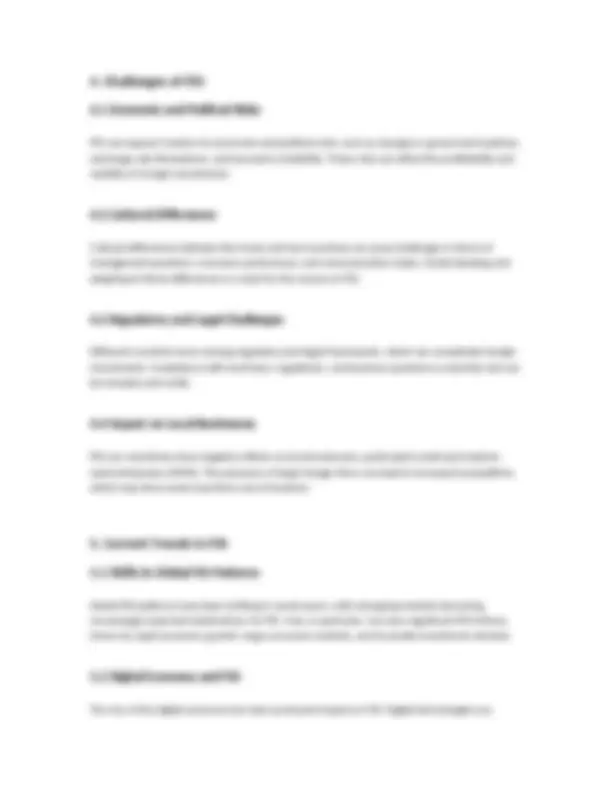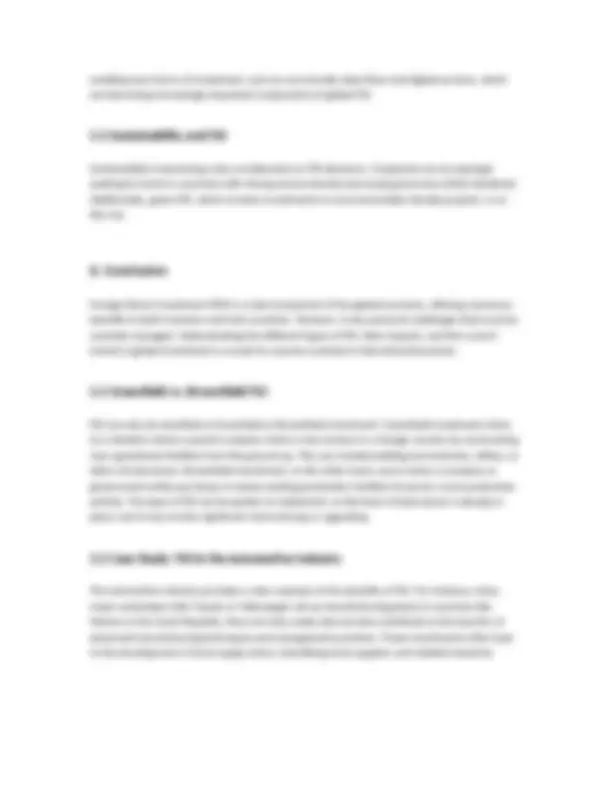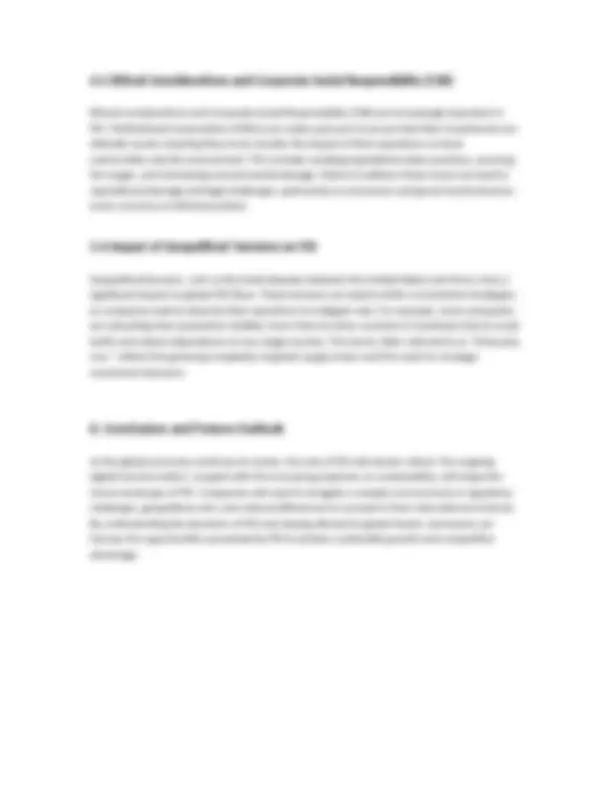





Study with the several resources on Docsity

Earn points by helping other students or get them with a premium plan


Prepare for your exams
Study with the several resources on Docsity

Earn points to download
Earn points by helping other students or get them with a premium plan
Community
Ask the community for help and clear up your study doubts
Discover the best universities in your country according to Docsity users
Free resources
Download our free guides on studying techniques, anxiety management strategies, and thesis advice from Docsity tutors
A comprehensive overview of foreign direct investment (fdi), covering its types, benefits, challenges, and current trends. Fdi plays a critical role in the global economy, offering capital for development, technology transfer, and job creation, particularly in developing countries. The lecture note explores the different forms of fdi, including horizontal, vertical, conglomerate, and platform investments, and discusses the economic, political, cultural, and regulatory challenges that investors may face. The document also highlights the shifting global fdi patterns, the impact of the digital economy, and the growing emphasis on sustainability in fdi decisions. By understanding the dynamics of fdi, businesses can navigate the complex global landscape and leverage the opportunities presented by international investment to achieve sustainable growth and competitive advantage.
Typology: Lecture notes
1 / 5

This page cannot be seen from the preview
Don't miss anything!




Foreign Direct Investment (FDI) refers to an investment made by a firm or individual in one country into business interests located in another country. It typically involves participation in management, joint-venture, transfer of technology and expertise. The key feature of FDI is that it involves long-term relationships and reflects a lasting interest in, and significant degree of influence on, the enterprise. FDI plays a critical role in the global economy, providing capital for development, enhancing skills, and creating jobs. It's a key driver for economic growth, especially in developing countries. This lecture note will cover the types, benefits, challenges, and current trends in FDI.
Horizontal FDI occurs when a company invests in the same business operation in a foreign country. For example, a car manufacturer in the United States opening a factory in China to produce the same cars it makes domestically is engaging in horizontal FDI. This is typically done to access new markets or reduce costs by taking advantage of cheaper labor or materials in the host country.
Vertical FDI is when a company invests in a foreign firm that may supply or distribute the company’s products. This can be further divided into two types: backward vertical FDI (investment in an industry that supplies inputs to the investing company) and forward vertical FDI (investment in industries that sell the outputs of the investing company).
Conglomerate FDI occurs when a company invests in a foreign business that is unrelated to its existing business in its home country. This type of FDI is less common because it involves
entering an entirely new industry, which can be risky.
Platform FDI refers to investments in a host country that are intended to export goods or services to a third country. For example, a U.S. firm may invest in a factory in Mexico, with the products being exported to Europe. This type of FDI is often driven by trade agreements or geographical advantages.
FDI brings substantial capital inflows into a host country, which can stimulate economic growth. These inflows can finance new projects, infrastructure, and other developments, leading to job creation and increased economic activity.
Foreign firms often bring advanced technology and managerial skills to the host country, which can improve productivity and innovation. Local firms can benefit from these transfers through knowledge spillovers and collaborations.
FDI creates employment opportunities in the host country, both directly through the operations of the foreign firm and indirectly through the development of related industries and services.
FDI helps integrate the host country into the global economy, facilitating trade, investment, and economic cooperation. This integration can lead to more stable and prosperous economic conditions.
enabling new forms of investment, such as cross-border data flows and digital services, which are becoming increasingly important components of global FDI.
Sustainability is becoming a key consideration in FDI decisions. Companies are increasingly seeking to invest in countries with strong environmental and social governance (ESG) standards. Additionally, green FDI, which involves investments in environmentally friendly projects, is on the rise.
Foreign Direct Investment (FDI) is a vital component of the global economy, offering numerous benefits to both investors and host countries. However, it also presents challenges that must be carefully managed. Understanding the different types of FDI, their impacts, and the current trends in global investment is crucial for anyone involved in international business.
FDI can also be classified as Greenfield or Brownfield investment. Greenfield investment refers to a situation where a parent company starts a new venture in a foreign country by constructing new operational facilities from the ground up. This can include building new factories, offices, or other infrastructure. Brownfield investment, on the other hand, occurs when a company or government entity purchases or leases existing production facilities to launch a new production activity. This type of FDI can be quicker to implement, as the basic infrastructure is already in place, but it may involve significant restructuring or upgrading.
The automotive industry provides a clear example of the benefits of FDI. For instance, when major automakers like Toyota or Volkswagen set up manufacturing plants in countries like Mexico or the Czech Republic, they not only create jobs but also contribute to the transfer of advanced manufacturing techniques and management practices. These investments often lead to the development of local supply chains, benefiting local suppliers and related industries.
Ethical considerations and Corporate Social Responsibility (CSR) are increasingly important in FDI. Multinational corporations (MNCs) are under pressure to ensure that their investments are ethically sound, meaning they must consider the impact of their operations on local communities and the environment. This includes avoiding exploitative labor practices, ensuring fair wages, and minimizing environmental damage. Failure to address these issues can lead to reputational damage and legal challenges, particularly as consumers and governments become more conscious of ethical practices.
Geopolitical tensions, such as the trade disputes between the United States and China, have a significant impact on global FDI flows. These tensions can lead to shifts in investment strategies, as companies seek to diversify their operations to mitigate risks. For example, some companies are relocating their production facilities from China to other countries in Southeast Asia to avoid tariffs and reduce dependence on any single country. This trend, often referred to as "China plus one," reflects the growing complexity of global supply chains and the need for strategic investment decisions.
As the global economy continues to evolve, the role of FDI will remain critical. The ongoing digital transformation, coupled with the increasing emphasis on sustainability, will shape the future landscape of FDI. Companies will need to navigate a complex environment of regulatory challenges, geopolitical risks, and cultural differences to succeed in their international ventures. By understanding the dynamics of FDI and staying attuned to global trends, businesses can harness the opportunities presented by FDI to achieve sustainable growth and competitive advantage.